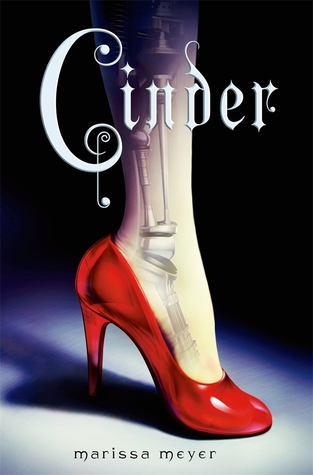"She was a cyborg and she would never go to a ball"
Sixteen-year-old Cinder is considered a technological mistake by most of society and a burden by her stepmother. Being cyborg does have its benefits, though: Cinder's brain interference has given her an uncanny ability to fix things (robots, hovers, her own malfunctioning parts), making her the best mechanic in New Beijing. This reputation brings Prince Kai himself to her weekly market booth, needing her to repair a broken android before the annual ball.
Although eager to impress the prince, Cinder's intentions are derailed when her younger stepsister, and only human friend, is infected with the fatal plague that's been devastating Earth for a decade. Blaming Cinder for her daughter's illness, Cinder's stepmother volunteers her body for plague research, an "honor" that no one has survived.
* * *
3 / 5
Cinder is one of those books that you are vaguely aware of and yet have never actually seen anywhere. Having recently read and enjoyed Meyer's Heartless, I decided to finally get around to hunting this book down in my local library (I had to order it in in the end), which was definitely worth it because this book is fun. It just doesn't have a whole lot of depth to it, which is why I awarded it three stars.
Cinderella is not my favourite fairytale, but I definitely thought this was a super cool adaption of it. Linh Cinder is an orphaned cyborg, a human with robotic augmentations, mechanic who lives under the "care" of her stepmother Adri (I just misspelt that as Aldi, which is probably quite appropriate ha) and with her two stepsisters Peony, the younger one and Cinder's friend, and Pearl. She is kept company by her robot Iko, an outdated model with an unusual personality chip. One day the sweet heartthrob Prince Kaito drops by her market stall to ask her to fix his personal robot before the annual ball.
Meanwhile, Earth is being wracked by a plague, Letomosis, and is facing war threats by the colony of Luna. The Lunars are perceived as a threat by the people of Earth because of their ability to use "glamour": they can force others to see them differently and to feel whatever emotions the Luna desires. Queen Levana has been in negotiations with the Emperor of the Eastern Commonwealth for many years, threatening war when he repeatedly rejects her offer of marriage.
"Does your kind even know what love is? Can you feel anything at all, or is it just ... programmed?"
I liked Cinder and Kai as characters. Kai is a gentleman; he's sweet, generous, and kind. In essence, he's the fairytale prince and he's a very likeable one. When his father falls ill and the governance of the Commonwealth falls to him, I really empathise with his difficult choices. Cinder is super cool; she's an amazing mechanic, covered in grease, and has a bit of spunk. Yeah, she's got the typical Cinderella deal: she's mistreated by her stepmother and she falls in love with a prince, so if you aren't down with that then this book isn't going to be for you. It's a bit cheesy, but it's supposed to be.
What was missing, however, was making use of the setting. This book could literally have been set anywhere, that's how bland it was. You could have told me it was set on one of Jupiter's moons and I'd probably have shrugged and gone yeah, alright. Cinder lives in New Beijing, rebuilt after the original Beijing was destroyed in World War IV, but there's no real indication of this, no little bits of Chinese culture. Cinder just uses Chinese names and throws around Chinese honourifics; replace the Emperor with a King and it could just as easily been set in England. Then there's the fact that Cyborgs are hated and feared in society, forced into a draft to be lab rats for the plague vaccine, but there's no reason why, no explanation. There's no real explanation of how the Lunars came to be either, or how their society really functions. This book is really light on the exposition.
"Soon, the whole world would be searching for her - Linh Cinder. A deformed cyborg with a missing foot. A mechanic with no one to run to, nowhere to go. But they will be looking for a ghost"
Cinder has too many plot threads hanging around. After Cinder's sister Peony gets ill, Cinder is volunteered by her stepmother to be a lab test-subject, something which no one survives. This is made out to be really important, but is sort of forgotten about relatively quickly. Then there's the threat of war and Queen Levana, the plague, the developing romance, all whilst trying to fit in with the Cinderella plot line. It's all a bit too much and none of it is really explore satisfactorily. Further, the supposedly massive plot twist at the end is very easily guessed; I literally got it within 50 pages.
Despite this negativity, Cinder is a fun, light read. I read it very quickly, in one day, and I thought it was cute and reasonably original, it's just not got a lot of depth to it. Cinder, the character, is a gem.


No comments:
Post a Comment